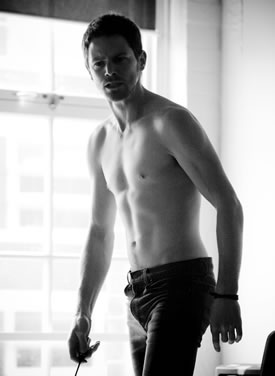Feature: Ian Meadows- From small things big things grow….
- March 17th, 2009
- Posted in Commentary
- Write comment

If you click on the link on the “What’s On Downstairs” page of Belvoir St Theatre’s website: you’ll be linked through to a grainy, black and white “teaser” of the upcoming show by Vassily Sigarev, “Ladybird.” Backed by what could either be an erratic heart-beat, a demanding military march, or the pulse of an insistent nightclub, is Meadows victorious, shadowboxing, dancing; and understandably so. There is a lot for him to be happy about.
Ian Meadows’ company Small Things Productions over the course of a year has scored a couple of significant achievements in the independent theatre scene: a grant from the Australia Council, a project with a prolific and talented director (Lee Lewis) and its first production at Belvoir St Theatre’s Downstairs Theatre. Produced by “a collective of young Australian artists committed to producing compelling, entertaining and socially urgent storytelling” the creative team includes the talents of designer Alice Babidge, Lighting Designer Luiz Pampohla, Adam Booth, Eamon Farren, Sophie Ross and Winner of the best Newcomer and Best supporting actress 2008 Sydney Theatre Awards: Yael Stone.
Founded with fellow actors Sophie Ross and Adam Booth, Small Things Productions has a big vision. What is interesting about the story of the company, the project and the telling of the “since graduating three years ago” story is the big picture sensibility Meadows talks about. There is a sense that he has a sense of longevity and sustainability in mind when he talks about this company and the possibilities of opening it up to projects beyond the here and now: beyond Ladybird.
Since moving to Sydney in 2007 as a freshly graduated actor from WAAPA, Meadows has been busy building his CV and networks. September 2008 introduced him to Sydney theatre audiences through multiple roles in Griffin Theatre’s production of Damian Millar’s award winning play The Modern International Dead, directed by Chris Mead for which he was nominated for Best Newcomer at the 2008 Sydney Theatre Awards.” “Up until that point I had mainly been working as a writer and in film and TV, which was nice after doing so much theatre [at WAAPA], to have a break from it, but that was an excellent way to get back into it.” Ian has received development grants from The NSW Film and Television office for his collaborations with fellow WAAPA graduate Josh Wakely, for a project he is created as sole writer, and more recently directing a short film through the Emerging Filmmakers Fund.
When asked about how he describes himself professionally: “how do I define my job position? Usually I say I’m a carpenter” he laughs at the joke. “It’s not true, I just like to say that, its easier.” A writer (of TV and film), an actor, a director, Meadows now adds the feather of producer to his cap. Although in the broadness of his role, he struggles to define his one obvious talent he has, except for the fact that all that he does is one thing: storytelling. In an awareness of his position as a storyteller he also speaks of the aspects of producing which have really helped him refine his focus. Describing producing as the opposite of the process of acting: [producing involves] “being aware of the outside, what’s on, when, what’s out there and is a completely different process from the close internal examination of the character.”
It’s clear that the stakes are higher as an actor when also in the position of producing. Meadows, talks about the importance of believing in the project completely, as it consumes ever moment of his life. He speaks highly of his co-producers and co-performers Adam Booth and Sophie Ross: “Adam has a talent for contracts and finances and Sophie has a knack at marketing and I just hope that I earn my position of producer … when it comes to writing anything, that’s when I think I make up for it.”
Despite Ladybird hailing from a new wave Russian playwright, the script is as relevant and pertinent to the area Western Australia where Meadows was raised. The story follows Dima who’s choices are limited by his circumstances and is about to join the army and it is a “savage, hilarious and haunting dissection of futile dreams and rage of those living on the urban fringes, yearning for escape.” Since finding the play early 2008, Meadow’s connection to the play has evolved with a changing political environment and economic climate, through both the impact of the change of Australian government and the recent change of the US Government. It is clear: in a “small” play, Meadows sees the world at large. There is a social conscience which drives Meadow’s curiosity and which has inspired him to put his money and talent where his mouth is.
Perhaps its Meadow’s ability to see the universal as local, and vice versa which ensures that Small Things Productions is about to embrace some big themes, big issues? Perhaps it is his insatiable work ethic which inspires him to tackles a demanding dramatic role and a demanding role as producer? Regardless one thing is clear: in a “small” play named after a